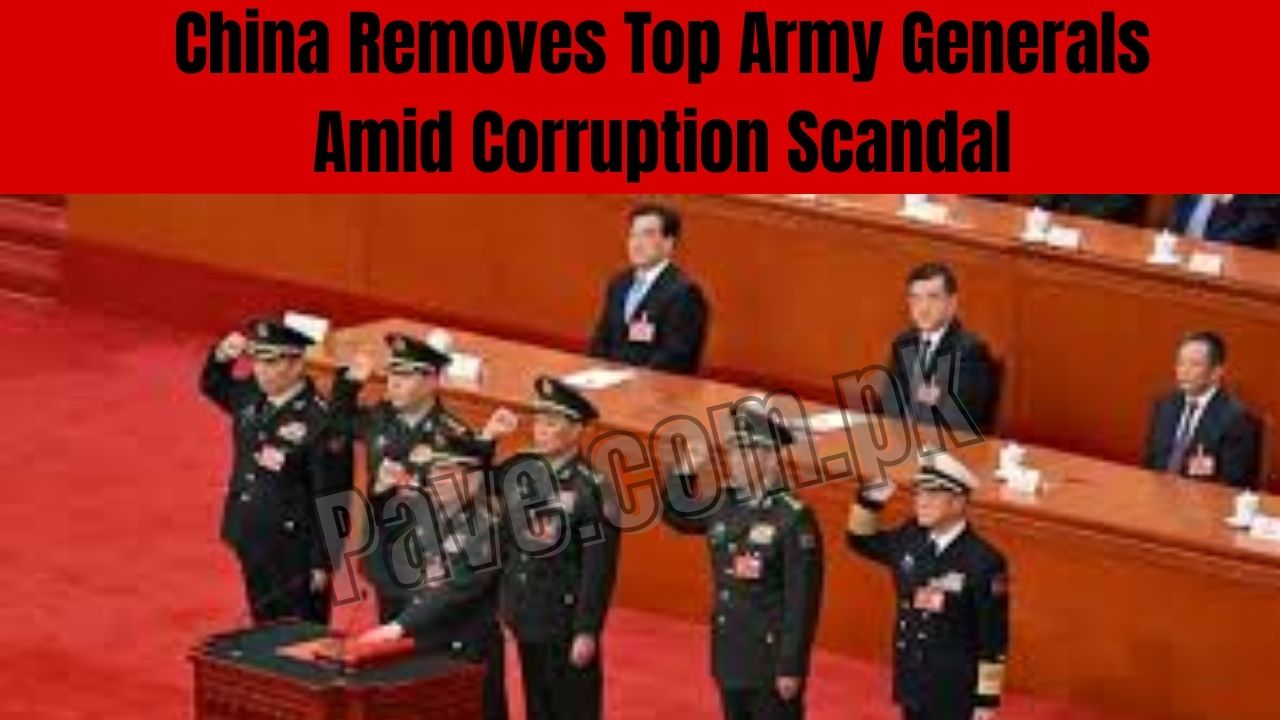China Removes Top Army Generals Amid Corruption Scandal – Major Shake-Up in Military Leadership

In a sweeping and highly symbolic move, China has dismissed several top-ranking generals from its military structure, citing corruption allegations. While state media described the action as part of President Xi Jinping’s anti-graft campaign, political analysts believe it signals something far deeper — a calculated restructuring of military power at a time of rising geopolitical pressure.China Removes Top Army Generals Amid Corruption Scandal
Not Just a Corruption Cleanup — A Signal to the Entire Military Hierarchy
Those removed reportedly belonged to sensitive military divisions, including the PLA Rocket Force, which oversees China’s nuclear missile arsenal, and the Equipment Development Department, responsible for weapons procurement and defense technologies.
This combination makes the purge unusually strategic. In most countries, a corruption removal within core defense units is handled quietly — yet Beijing chose to expose it publicly, which analysts interpret as a warning disguised as transparency.
“The message is clear: no rank is high enough to guarantee immunity,” said a geopolitical commentator based in Singapore.
Why Now? Timing Raises Global Questions
China is currently navigating multiple pressure fronts:
| Front | Activity Underway |
|---|---|
| Taiwan Strait | Intensified military flyovers and naval drills |
| South China Sea | Increased confrontation with Philippines and U.S. allies |
| U.S.-China Tensions | Ongoing tech war, trade disputes, and military posturing |
| Defense Modernization | Rapid development of hypersonic missiles and AI warfare |
Removing generals from nuclear and missile units during such a critical period suggests that Beijing either uncovered serious internal breaches — or is restructuring to prepare for bigger strategic moves.
Read Also: CM Maryam Punjab Free Tablet Scheme 2025
Is Xi Jinping Replacing Influence Networks Within the Army?
Xi Jinping’s rule has been marked by an unprecedented level of centralization. Since taking office, he has:
- Removed more generals than any leader since Mao
- Redefined military loyalty under the slogan “The Party Commands the Gun”
- Placed intelligence officers and political loyalists in key security roles
This purge appears to follow the same pattern — eliminate potential weak links, tighten ideological discipline, and rebuild command chains around absolute loyalty rather than just competence.
Some intelligence experts believe these corruption charges may mask broader accusations like espionage, policy resistance, or foreign contact risks.
Impact on China’s Military Trajectory
While the removals may temporarily disrupt certain departments, they could strengthen centralized command in the long term — especially if Xi replaces ousted generals with younger, tech-savvy, and ideologically aligned officers.
| Potential Outcome | Strategic Effect |
|---|---|
| Stronger Political Control | Reduces risk of dissent within high command |
| Short-Term Instability | Slows decision-making during leadership reshuffle |
| More Aggressive Leadership? | New commanders may pursue more assertive military posture |
✅ How Strong Is the Chinese Army?
China’s military, officially known as the People’s Liberation Army (PLA), is considered one of the most powerful armed forces in the world. Over the past two decades, China has transformed from a large but outdated force into a highly modernized and technologically advanced military, focusing on:
| Military Branch | Strength Highlights |
|---|---|
| Ground Forces (PLA Army) | Over 1 million active soldiers, equipped with modern tanks, drones, artillery, & missile systems |
| PLA Navy (PLAN) | Largest navy in the world by number of ships — including aircraft carriers, destroyers, submarines |
| PLA Air Force (PLAAF) | 5th-generation stealth jets (J-20, J-31), advanced bombers & drones |
| Rocket Force (PLARF) | Controls China’s nuclear and hypersonic missile arsenal |
| Strategic Support Force (Cyber & Space) | Handles satellites, cyber warfare, AI command systems |
China’s defense budget in 2024 crossed $230 billion, second only to the United States, allowing rapid modernization in AI warfare, naval fleets, anti-ship missiles, and space security.
Conclusion: China has shifted from being a manpower-heavy army to a technology-driven superpower-level military force.
✅ Is China Stronger Than Russia’s Military?
In traditional warfare, Russia still holds advantages in:
- Nuclear weapon stockpile (Russia has 5,500+ warheads vs. China’s estimated 500+)
- Combat experience, especially from ongoing conflicts like Ukraine and Syria
However, in terms of modernization, manufacturing speed, and future readiness, China is now considered stronger or rapidly overtaking Russia.
| Comparison Area | Russia | China | Stronger Side |
|---|---|---|---|
| Active Soldiers | ~830,000 | ~2,000,000 | China |
| Navy Size | ~600 ships | 790+ ships | China |
| Defense Production | Slower, sanctions-affected | Fastest-growing in world | China |
| Economy Support | Weak under sanctions | World’s 2nd largest economy | China |
Conclusion: Russia is battle-hardened, but China is more industrially capable and technologically advanced, making it strategically stronger in long-term warfare potential.
✅ Who Has the Largest Army in the World?
As of 2025:
| Rank | Country | Active Soldiers |
|---|---|---|
| 1 | China | ~2,000,000 |
| 2 | India | ~1,450,000 |
| 3 | United States | ~1,390,000 |
| 4 | North Korea | ~1,200,000 |
| 5 | Russia | ~830,000 |
➡️ China officially has the largest active-duty army in the world by personnel — though the U.S. remains globally dominant when total military power index (technology + logistics + alliances) is considered.
✅ Why Is 2027 Important for China?
The year 2027 is highly significant because:
- It marks the 100th anniversary of the founding of the People’s Liberation Army (PLA), established in 1927.
- President Xi Jinping has set 2027 as the target year for completing major military modernization goals.
- U.S. intelligence reports claim China aims to have full invasion capability against Taiwan by 2027.
Read Also: United 125cc All-New Model 2026 Launched in Pakistan – Price, Specs, Opinion
According to Pentagon reports, China is rapidly preparing for:
- Full amphibious landing capability
- Space and cyber dominance
- Nuclear triad expansion
- AI-backed autonomous warfare systems
This makes 2027 a potential flashpoint year, especially regarding Taiwan, South China Sea tensions, and U.S.-China rivalry
China has shocked the world once again by abruptly removing several high-ranking military officials amid a widening corruption scandal inside its most elite defense wings. The sudden purge — involving generals from the People’s Liberation Army (PLA) Rocket Force, the branch responsible for nuclear and missile operations — has raised concerns both domestically and internationally.
Was this just another anti-corruption move, or is it part of a larger power consolidation by President Xi Jinping? Let’s break down what’s happening.
✅ Key Highlights of the Scandal
- Multiple top-ranking PLA generals have been removed or placed under investigation.
- Most of them were from the Rocket Force, China’s nuclear missile command.
- Reports suggest embezzlement, bribery, and procurement fraud worth billions of yuan.
- The purge is seen as Xi Jinping tightening his grip over the military.
- Analysts warn this could temporarily weaken China’s strategic readiness.
Which Generals Were Removed?
While China has not officially released full details, several senior commanders reportedly dismissed or detained include:
| Name | Former Position | Status |
|---|---|---|
| Gen. Li Yuchao | Commander of Rocket Force | Removed & Investigated |
| Gen. Liu Guangbin | Deputy Commander | Disappeared from public view |
| Lt. Gen. Zhang Zhenzhong | Chief of Staff | Suspected of “serious violations” |
| Multiple Procurement Officers | Logistics & Equipment | Under detention |
State media has avoided naming corruption charges, simply referring to them as “disciplinary violations”, a common phrase used for political purges in China.
Why Is the Rocket Force at the Center of the Scandal?
The Rocket Force is one of China’s most secretive and powerful military divisions, responsible for:
- Nuclear missile launch systems
- Space deterrence and long-range strike programs
- Hypersonic weapon development
Such departments control massive budgets and confidential projects, making them high-risk zones for corruption.
Reports suggest that fake equipment purchases, bribery in promotions, and substandard missile parts may have been involved — raising concerns about China’s combat readiness.
Xi Jinping’s Anti-Corruption Campaign — Genuine Clean-Up or Power Grab?
Since coming to power in 2012, Xi has imprisoned or dismissed over 200 military officials, including two former defense ministers.
While Beijing promotes this as a morality-based anti-graft drive, critics argue it is also a tool to eliminate rivals.
Two Theories Behind the Purge:
| Theory | Explanation |
|---|---|
| Genuine Anti-Corruption Campaign | Xi is trying to clean up deeply rooted corruption to strengthen military discipline. |
| Political Power Consolidation | Xi is replacing officers loyal to previous leadership with those who are personally loyal to him. |
Both may be true — morality and politics often overlap in authoritarian systems.
How Does This Affect China’s Military Strength?
The removal of multiple top generals from a single military branch can create instability and leadership gaps.
Potential Impacts:
- Short-Term Disruption in decision-making.
- Confusion within ranks — fear of being investigated.
- Delays in weapon development — especially nuclear and missile projects.
- Increased U.S. intelligence monitoring, as adversaries see this as a moment of vulnerability.
However, in the long run, if Xi manages to replace corrupt officials with loyal and efficient officers, the military could become more disciplined and centralised.
Read Also: Read Also: United 125cc All-New Model 2026 Launched in PakistanReal Buyer Opinion
International Reaction — Concern or Opportunity?
The United States, India, Japan, and NATO allies are closely watching.
Some analysts believe China’s internal purge could slow down its external aggressiveness, especially in the South China Sea and Taiwan Strait.
Others fear Xi may double down on nationalism to divert public attention from internal scandals.
Corruption in the Chinese Army — A Repeated Pattern
This is not the first time China’s military has faced such scandals.
| Year | Incident | Outcome |
|---|---|---|
| 2014 | Two top generals accused of selling ranks | Sentenced to life imprisonment |
| 2017 | PLA medical division caught in bribery scheme | Dozens removed |
| 2023 | Defense minister disappeared mysteriously | Believed to be linked to corruption |
Military corruption is systemic, not isolated. The larger question is — how deep does it go?
Is Xi Truly in Control — or Fighting Hidden Resistance?
While state media portrays Xi as a strong leader purging corruption, some insiders believe there may be internal resistance from military factions who feel threatened.
The Chinese Communist Party fears disloyalty within the army more than foreign threats.
Historically, in Chinese dynasties, military coups have toppled rulers — something Xi is determined to prevent.
What Happens Next?
Expect the following developments:
✅ New Rocket Force leaders will be appointed, likely handpicked by Xi.
✅ More investigations may continue across other PLA branches.
✅ Propaganda campaigns will highlight “patriotism over personal gain.”
✅ Xi may push for more direct control over nuclear command structures.
Conclusion — A Stronger China or a Shaken One?
China’s decision to remove top generals is bold but risky. It shows Xi Jinping is willing to uproot power networks, even within core military institutions.
Whether this results in a cleaner, more loyal army — or a fear-driven, unstable command structure — remains to be seen.
But one thing is clear:
🔴 China’s biggest threat right now is not foreign enemies — it’s internal corruption and distrust.










